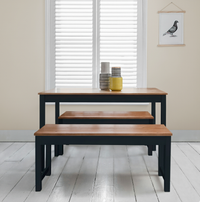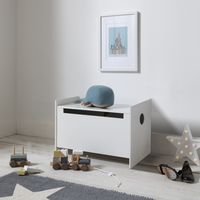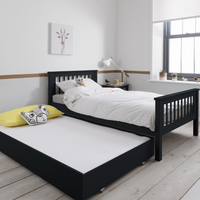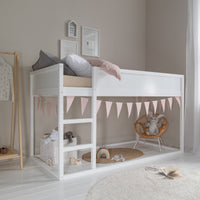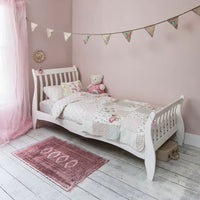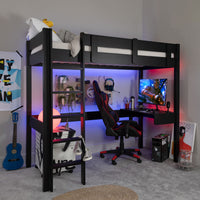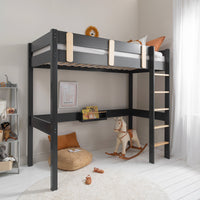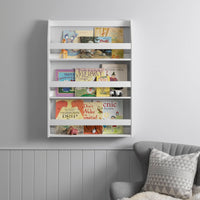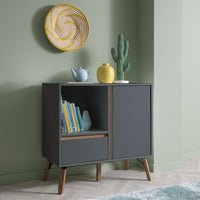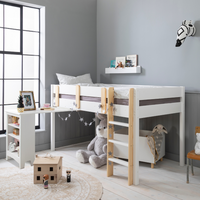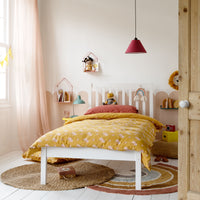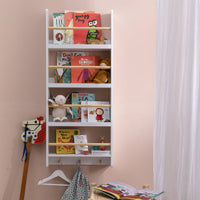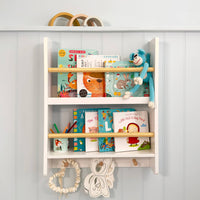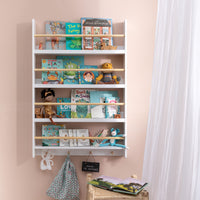 Making more of other fun activities can lessen the attraction of hours of TV viewing. Why not invest in a space for your child to study, draw and read in the bedroom? We sell a great selection of cabin beds with desks that will give them a space of their own to explore other interests.
Making more of other fun activities can lessen the attraction of hours of TV viewing. Why not invest in a space for your child to study, draw and read in the bedroom? We sell a great selection of cabin beds with desks that will give them a space of their own to explore other interests.
A question that often splits parents into ‘for’ and ‘against’ camps: should you allow your child to have a television in their bedroom? Today on the blog we’re looking into some of the reasons why parents allow a TV and some arguments as to why you may not be so keen. Let us know on Facebook and Twitter where you stand!
Sleep time aid
Many parents feel that there is no harm in having a TV in their child's bedroom as the light and noise can help them to drift off to sleep easier at night. And, with a use of the timer, you can ensure that the TV turns itself off after they are sound asleep. This method does require monitoring from parents to keep an eye on what is being watched and how often it is being watched.
Many parents see a TV in the bedroom as an educational tool too, with children able to watch their favourite shows and educational series in the comfort of their own rooms without a battle for the living room remote.
What to watch
Without close monitoring it is possible to lose a bit of control over what children can watch when a TV is in their bedroom. With an abundance of channels available, the chances of them stumbling across something that is inappropriate or confusing increases, and, if no one is around to explain more about what they have seen, this could be harmful.
It’s also harder to keep track of when they’re watching TV, particularly if they are being sneaky and watching it with the sound turned off! This means late night viewing could cause tiredness and lack of concentration the next day, which does nothing to help their learning. If you have a digital TV package you may find you’re able to set parental controls to help tackle some of these issues.
Unhealthy?
Under supervision, many children develop a sensible attitude to watching TV in the bedroom. However, the New York Times compiled research from several sources suggesting that the presence of a TV can increase levels of obesity in children, as well as sleep-related issues. Other concerns about the impact of viewing time include diverting concentration from other activities, such as playing outside in the fresh air, reading, crafts and sports.
Establish a routine
Each child is different and will have their own reaction to having a TV in their bedroom. So, if you’re being pestered by your tween or teen, maybe instead of agonising over the choice, you could test out having a TV in the bedroom before agreeing to make it a permanent fixture? Aim for a happy medium of allowing a TV in the bedroom to be watched at certain times or allowing the viewing of particular programmes, though you may find you need to 'police' the policy. Establishing a routine of TV time is a great way to set boundaries and to re-establish the TV as one of many forms of entertainment and education.
 Making more of other fun activities can lessen the attraction of hours of TV viewing. Why not invest in a space for your child to study, draw and read in the bedroom? We sell a great selection of cabin beds with desks that will give them a space of their own to explore other interests.
Making more of other fun activities can lessen the attraction of hours of TV viewing. Why not invest in a space for your child to study, draw and read in the bedroom? We sell a great selection of cabin beds with desks that will give them a space of their own to explore other interests.
 Making more of other fun activities can lessen the attraction of hours of TV viewing. Why not invest in a space for your child to study, draw and read in the bedroom? We sell a great selection of cabin beds with desks that will give them a space of their own to explore other interests.
Making more of other fun activities can lessen the attraction of hours of TV viewing. Why not invest in a space for your child to study, draw and read in the bedroom? We sell a great selection of cabin beds with desks that will give them a space of their own to explore other interests.

